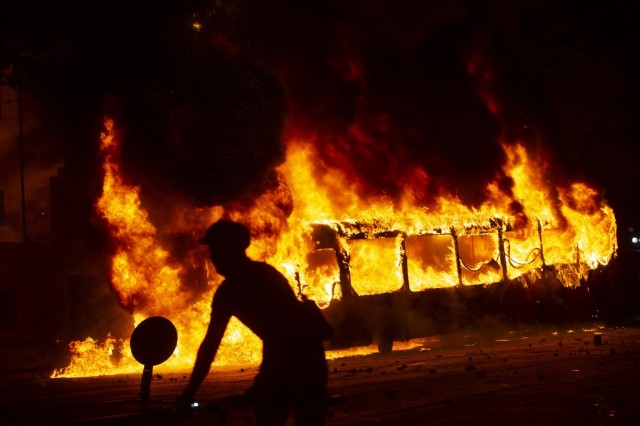
This blogger’s heart is breaking as the news from Chile keeps getting worse. For the past several days Santiago has been rocked by protests over an increase in public transportation fares, and these protests have given way to rioting and looting. Which in turn has given way to the government imposing a state of emergency, sending the army into the streets and imposing a 7 pm to 6 am curfew. It seems like a flashback to the dark days of the dictatorship headed by General Augusto Pinochet (1973-1990).
Three people were killed when a supermarket in Santiago was set on fire, and some airlines are cancelling flights to the Chilean capital–airport and airline employees can’t get to work. And the unrest has spread to other Chilean cities.
My friend and colleague Odette Magnet sent me this report from Santiago:
“Friday afternoon, 4 p.m. I am on the corner of Tobalaba and Providencia avenues, trying to get home in the La Reina municipality of Santiago. Hundreds of people are on foot, walking calmly and in silence. It was hot, but people were not complaining. The buses were not stopping because they were full to capacity. I counted 40 taxis passing by, all filled. Dozens of cars with no passengers, only their drivers, passed by. I tried to make eye contact. Nothing. No one stopped to offer anyone a lift. I was shocked. The slogan that we’re a solidarity country seems like a joke. Another popular myth.
Santiago awoke on Saturday the 19th with tanks and soldiers in the streets, under a state of emergency. Along with thousands of my compatriots, I found the scene painful, and in a split second we were back in the dark days of the military dictatorship. As if that weren’t enough, that same day President Sebastián Piñera declared a curfew.
For 17 years Chile was an armored country, with successive states of exception: the state of emergency, the state of siege, of disturbance to the internal peace. Cruel dictatorship. This is the first time a state of emergency has been imposed since Chile returned to democratic rule, with the brief exception of the 2010 earthquake. Chile’s digital newspaper El Mostrador bore this headline: “The day after black October 18, the military controls Santiago, as it did in the 1980s.” But despite this people beat saucepans and honked car horns throughout the capital. The city was under a state of emergency, but it was not asleep. As the hours passed the protests grew and Piñera was forced to suspend the fare increase in the Santiago metro.
Up till then the government had managed to evade the source of the conflict, it only reinforced police action and applied the State Security Law. As we Chileans put it, he threw gasoline on the fire.
For a week now the Chilean capital has been witness to daily demonstrations by students protesting the fare hike. Saturday’s tally: 308 arrests, 500 soldiers in the streets and reports of 11 people injured. 41 of the nearly 140 Metro stations were damaged, and some were burned. 16 buses were also burned. Police officers injured. There was looting in some parts of Santiago and a building belonging to the state energy corporation, Enel, was burned.
What happened over the past few days is the unmistakeable scream of a country that can’t take any more. There are millions with pent up rage who feel they have nothing left to lose. The underlying reason is not the Metro fare hike but the scandalous inequality in our society. Chile is the most unequal country in the region. This malaise was always going to erupt: people feel defenceless in the face of the rising cost of utilities, education, health care and the mismanagement of pension funds.
In the face of despair, extreme actions. Students began fare jumping in the Metro and a group of vandals did the rest, looting stores, banks, burning buses and destroying traffic lights.
Meanwhile, Piñera was writing his official speech and giving assurances that our country, in comparison with the rest of Latin America, “is an oasis.”
Something is very wrong here. Chile’s soul is rotting.”

